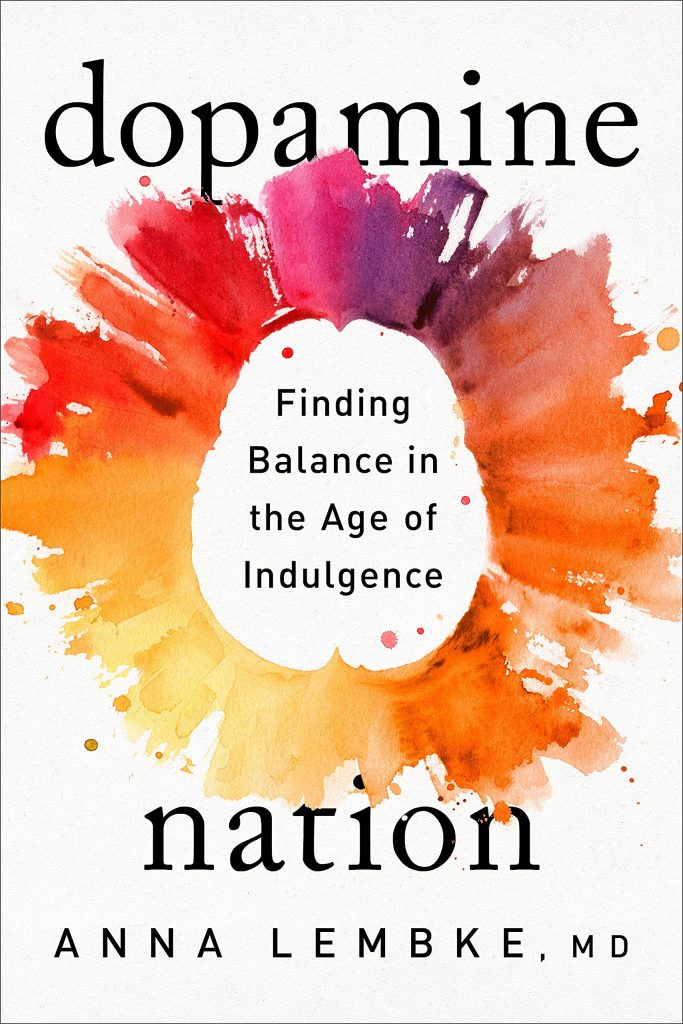Dopamine Nation: Finding Balance in the Age of Indulgence by Anna Lembke, MD
Running from Pain
By protecting our children from adversity, have we made them deathly afraid of it? By bolstering their self-esteem with false prays and the lack of real world consequences, have we made them less tolerant, more entitled, and ignorant of their own character defects? By giving into their every desire, have we encouraged a new age of hedonism?
The practice of medicine has likewise been transformed by our striving for a pain-free world.
A paradigm shift around pain has translated into massive prescribing a few good pills, today, more than one and four American adults — more than one and 20 American children — takes a psychiatric drug on a daily basis.
Similar lines, Neil Postman, the author of the 1980s classic Amusing Ourselves to Death, wrote, “Americans no longer talk to each other, they entertain each other. They do not exchange ideas, they exchange images. They do not argue with propositions; they argue with good books, celebrities, and commercials.”
It’s a way of becoming familiar with yourself. I was letting your experience unfold without trying to control it or run away from it. All that distracting yourself with devices may be contributing to your depression and anxiety. It’s pretty exhausting avoiding yourself all the time.
The question is: why, in a timer unprecedented wealth, freedom, technological progress, and medical advancement, do we appear to be unhappy or in a more pain than ever? The reason we’re also miserable may be because we’re working so hard to avoid being miserable.
The Pleasure-Pain Balance
The pleasure-pain balance is triggered not only by re-exposure to the drug itself but also by exposure to cues s associated with drug use. In Alcoholics Anonymous, a catchphrase to describe this phenomenon is people, places, and things. In the world of neuroscience, this is called cue-dependent learning, also known as classical Pavlovian conditioning.
Clinical work I see people who struggle with severe addiction slipping right back into compulsive use with a single exposure, even after years of abstinence. This may occur because of persistent sensitization to the drug of choice, the distant echoes of earlier drug use.
Science to us that every pleasure exact surprise, and the pain that follows is longer lasting and more intense than the pleasure that gave rise to it.
Dopamine Fasting
Consider her current behavior in light of her future self.
Ask my patients, “what kinds of barriers can you put into place to make it harder for you to get easy access to your drug of choice?”
Self binding can be organized into three broad categories: physical strategies (space), chronological strategies (time), and categorical strategies (meaning).
Pressing on the Pain Side
In humans, high levels of physical activity in junior high, high school, and early adulthood predict lower levels of drug use.
Radical Honesty
Recount experiences gives us mastery over them. Whether in the context of psychotherapy, talking to an AA sponsor, confessing to a priest, confiding in a friend, or writing in a journal, our honest disclosure brings her behavior into relief, allowing us in some cases to see it for the first time. This is especially true for behaviors that involve a level of automaticity outside of conscious awareness.
Questions:
- Why do you want to make that change?
- What would you be giving up if you stop that behavior?
- What is one step you can take to change that behavior?
The way we tell our personal stories is a marker and predictor of mental health. Patients who tell stories in which they are frequently the victim, seldom bearing responsibility for bad outcomes, are often unwell and remain unwell. They are too busy blaming others to get down to the business of their own recovery. By contrast, when my patients start telling stories that accurately portrayed their responsibility, I know they’re getting better.
But if the therapist can help the patient take responsibility if not for the event itself, and for how they react to it in the here and now, that patient is empowered to move forward with their life.
Prosocial Shame
In validating what she already knew to be true – her lack of musical ability – I encouraged her skills at accurate self appraisal, skills she continues to demonstrate to this day. I also sent the message that we can’t be good at everything, and it’s important to know what you’re good at and what you’re not good at, so you can make wise decisions.
